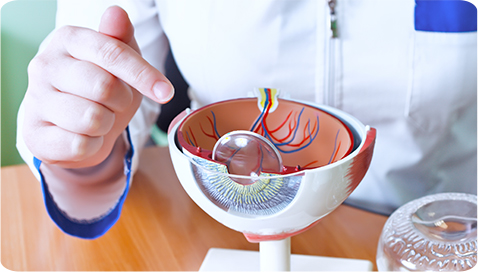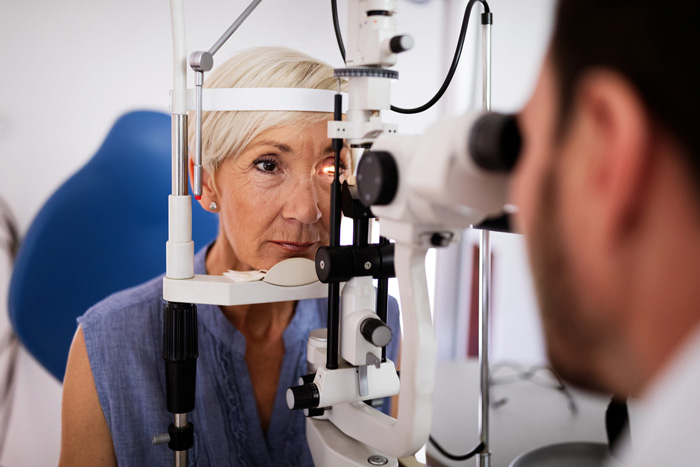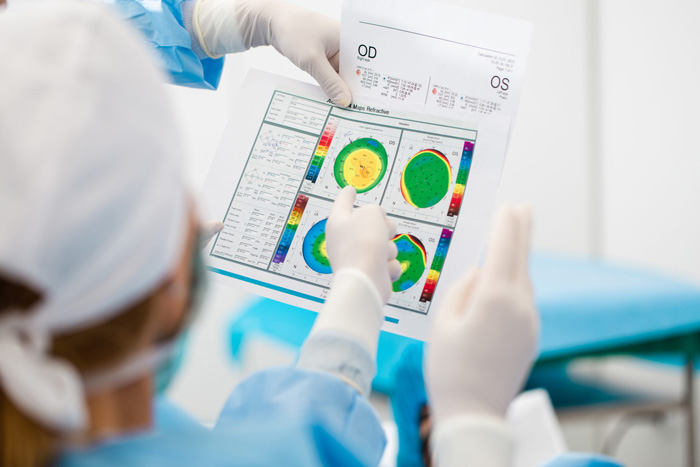Cataracts &
Cataract Surgery in
the Pacific Northwest
Having trouble with your vision as you age? The cause could be a variety of reasons, but statistically, it’s likely that you have a developing cataract. In fact, 24.4 million Americans are affected by cataracts after the age of 40! [1]
A cataract is characterized by the gradual clouding of the eye’s natural lens that causes vision loss over time. Cataracts are a natural part of aging and cataracts are a very common condition in older adults. Fortunately, vision loss due to a cataract doesn’t have to be permanent and it can be easily corrected with surgery. Modern cataract surgery technology is able to restore visual loss due to cataracts.

What Is a Cataract?
As you get older, your eyes will change in many ways. Some of these changes occur within your eye’s natural, crystalline lens. Your lens is clear because of a precise arrangement of proteins that are critical to its structure, but that structure may break down as the lens ages.
When the lens loses its clarity, one may notice that the vision isn’t as sharp as it used to be. At K2 Vision, we recommend that once age-related vision starts to affect the quality of your life in any way, you should schedule an appointment with one of our expert doctors to explore your options for clear vision in the future.
Ready to repair your vision?
Schedule your virtual consultation right now to find out if you are a candidate for cataract surgery.
Click the button below to schedule!

What Is Cataract Surgery?
Once your lens is so cloudy that it affects your activities of daily living, it’s classified as a visually-significant cataract. In this case, cataract surgery is your best bet to see clearly once again!
Cataract surgery is a relatively quick outpatient procedure where a cataract surgeon will replace the eye’s natural crystalline lens with an intraocular lens (IOL) that can either restore or improve your eyesight. Cataract surgery is a similar procedure to Refractive Lens Exchange (RLE), one of the specialized vision correction surgeries offered at K2 Vision.
Modern cataract surgery can offer amazing outcomes, especially when considering the array of new technology IOLs available. Modern lenses can provide clear distance vision and simultaneously, excellent near vision.
Standard cataract surgery with a monofocal lens is aimed at correcting the vision to be clear at distance yet glasses may be needed for reading. New Technology lens replacement surgery at K2 Vision has the potential to help you see more clearly at both distance and near.

How Is Cataract Surgery Performed?
Prior to your cataract surgery, you’ll need an appointment to have your eyes examined. At the preoperative evaluation, you will receive instructions on what to do for the day of your procedure.
During the procedure itself, you will be numbed with an eyedrop anesthetic, so that you won’t feel anything! The most advanced cataract surgeons will use phacoemulsification technology to break up the cataract, making it easier to extract and aiding your recovery. They will then simply remove the cataract through a small microincision and replace it with your new IOL.
The cataract surgery procedure can take as little as 10 minutes per eye! From there, it’s onto the recovery phase.

Cataract Surgery Recovery
Though complete recovery from cataract surgery may take up to a few weeks, you may see restored vision as quickly as within just a few hours of your procedure. And, while your physician will make specific recommendations for your recovery, the surgery and recovery is very simple.
Cataract surgery and lens exchange surgery is an outpatient procedure and patients will go home the same day, usually right after the procedure is completed. You may need to take a couple days to avoid activities, physical or otherwise, that could strain your eyes. You’ll also need to wear a protective shield over your eyes as you sleep for a while and take some prescription eye drops before and after your operation.
Some side effects like a mild foreign body sensation after surgery are normal, but most people can resume normal activities within 1 day of the procedure. If you have questions, never be afraid to follow up with your surgeon.
Am I a Candidate for Cataract Surgery?
Vision loss can begin to occur gradually as a cataract develops, so it’s important to be alert, take note of any changes in your eyesight, and most importantly, see a specialist about your vision as soon as you notice the first signs of a drop in your vision quality.
A consultation with a physician at K2 Vision can help determine the source of your vision loss and the best solution to improve your vision. After careful evaluation, we will have a productive conversation with you about the right solutions for your unique eyes.
K2 Vision’s specialization in Refractive Lens Exchange (RLE) gives us a unique vantage point from which we can offer relief for your lens-based vision loss — even prior to the formation of mature cataracts. We can help patients long before the actual development of significant cataracts, so at every stage of life, if you wish to obtain freedom from glasses or contact lenses,, it’s worth coming in for a consultation with us. Contact K2 Vision today and see how we can change your life with the help of advanced vision correction surgery!
